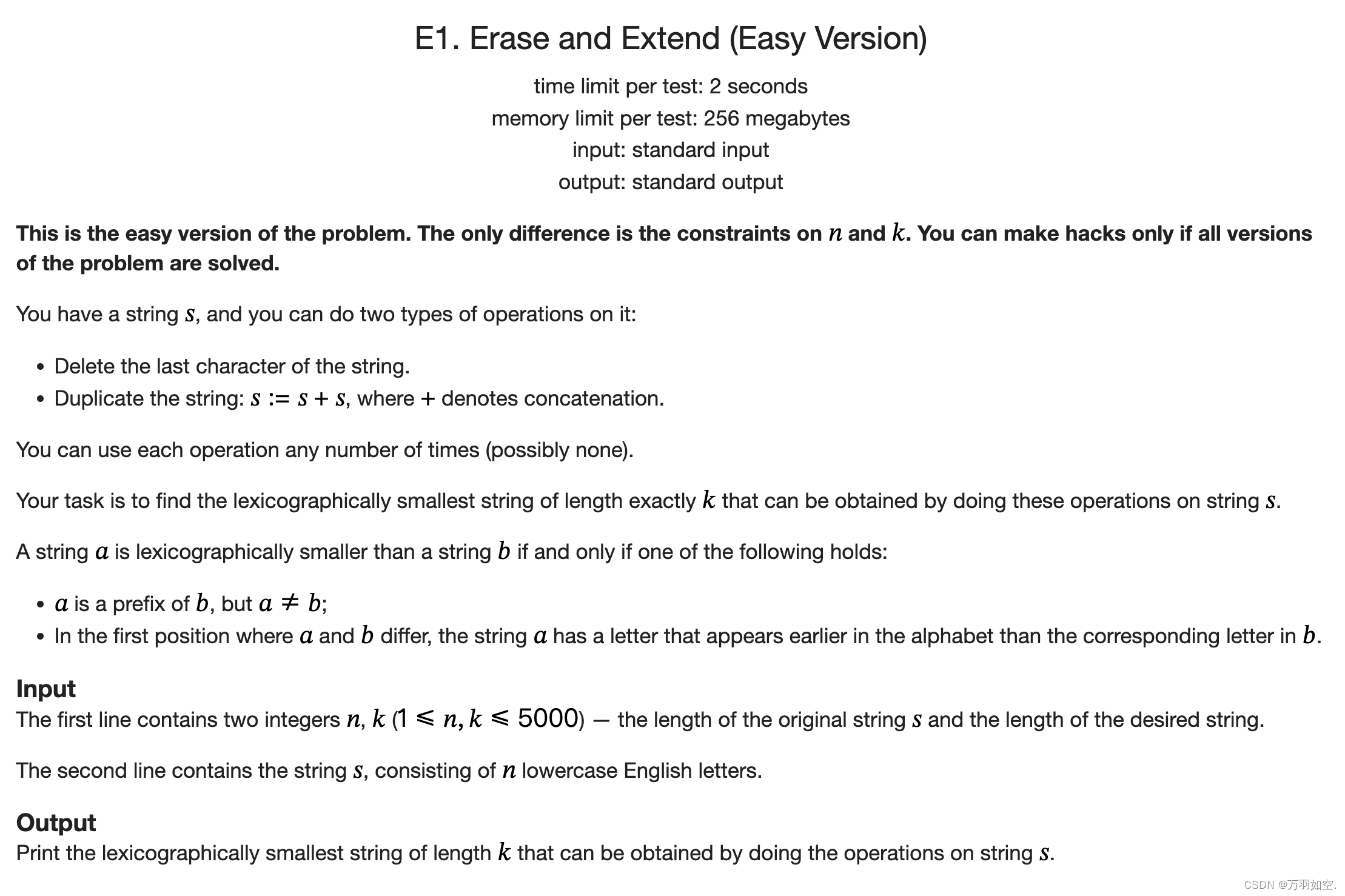
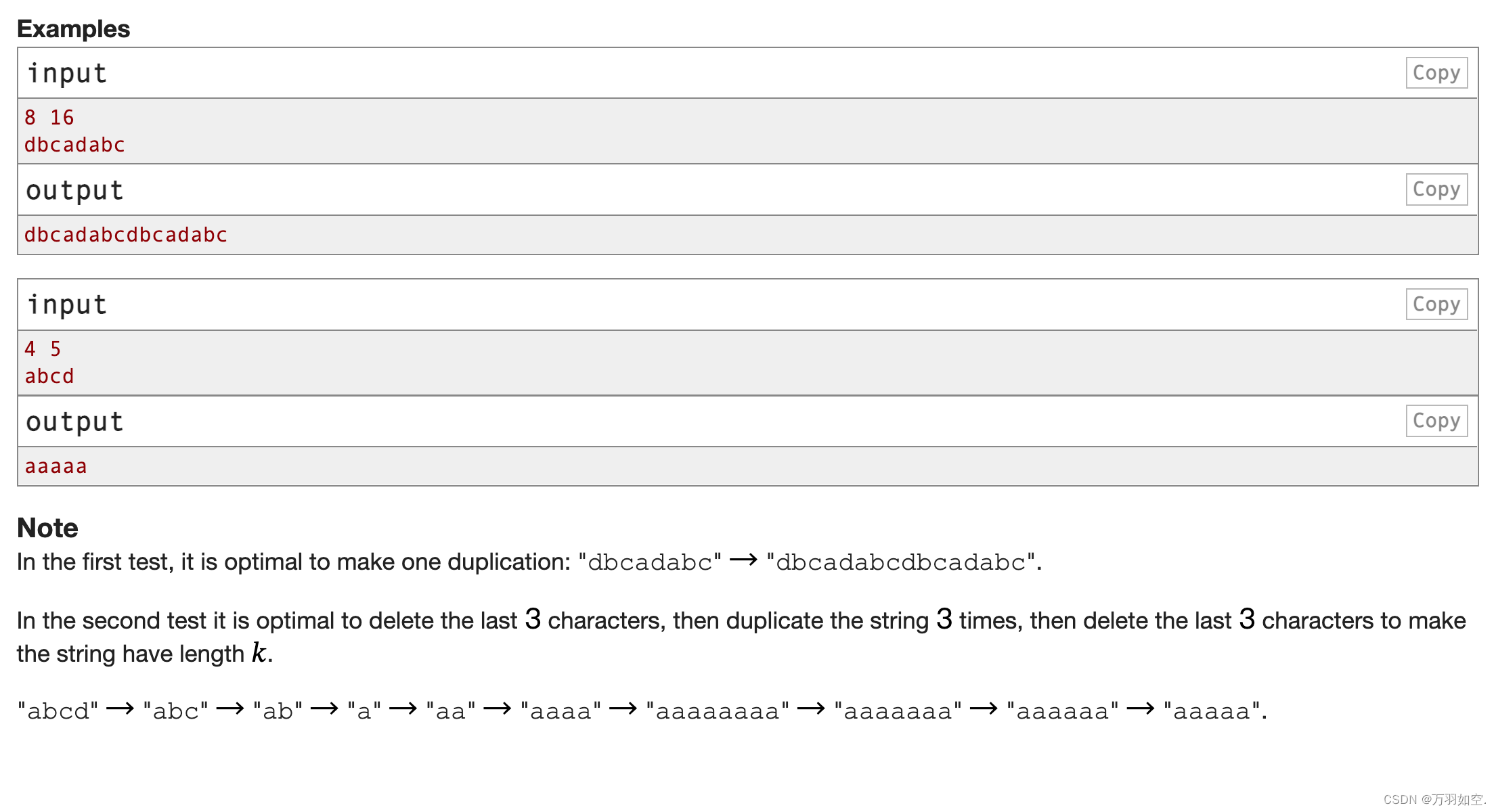
翻译:
这是这个问题的简单版本。唯一的区别是𝑛和𝑘上的约束。只有当所有版本的问题都解决了,你才能进行hack。
你有一个字符串𝑠,你可以对它做两种类型的操作:
删除字符串的最后一个字符。
复制字符串:𝑠:=𝑠+𝑠,其中+表示连接。
每个操作可以使用任意次数(可能不使用)。
您的任务是通过对字符串𝑠执行这些操作,找到长度恰好为𝑘的字典编纂学上最小的字符串。
当且仅当下列条件之一满足时,字符串𝑎在字典结构上小于字符串𝑏:
𝑎是𝑏的前缀,但𝑎≠𝑏;
在𝑎和𝑏不同的第一个位置上,字符串𝑎在字母表中出现的字母比𝑏中相应的字母更早。
输入
第一行包含两个整数𝑛,𝑘(1≤𝑛,𝑘≤5000)—原始字符串𝑠的长度和所需字符串的长度。
第二行包含字符串𝑠,由𝑛小写英文字母组成。
输出
打印长度为𝑘的按字典顺序最小的字符串,该字符串可以通过对字符串𝑠进行操作获得。
例子
inputCopy
8 16
dbcadabc
outputCopy
dbcadabcdbcadabc
inputCopy
4个5
abcd
outputCopy
五星级
请注意
在第一个测试中,做一个副本是最优的:"dbcadabc"→"dbcadabcdbcadabc"。
在第二个测试中,最好是删除最后3个字符,然后复制字符串3次,然后删除最后3个字符,使字符串的长度为𝑘。
“abcd”→“abc”→“ab”→“a”→“aa”→“aaaa”→“aaaaaaaa”→“aaaaaaa”→“aaaaaa”→“aaaaa”。
思路:
可以删除最后一个,然后复制字符串,然后构成长度为k的,其字典序最小的字符串。所以我们直接从前往后每次比较,如果前边的字符比后面的小则可以替代,如果相同则就是比较下一位,然后来不断更新最小的串。
上边的一份代码是暴力模拟T掉,因为这样模拟,遇到全是小回文串的字符串,每次都会跑完,直接被无情卡掉。
代码:
//#include <iostream>
//#include <algorithm>
//#include <string.h>
//#include <string>
//#include <math.h>
//#include <stdio.h>
//#include<vector>
//#include<queue>
//#include<stack>
//#include<map>
//#include<set>
//#include<tuple>
//#include<numeric>
//using namespace::std;
//typedef long long ll;
//inline __int128 read(){
// __int128 x = 0, f = 1;
// char ch = getchar();
// while(ch < '0' || ch > '9'){
// if(ch == '-')
// f = -1;
// ch = getchar();
// }
// while(ch >= '0' && ch <= '9'){
// x = x * 10 + ch - '0';
// ch = getchar();
// }
// return x * f;
//}
//inline void print(__int128 x){
// if(x < 0){
// putchar('-');
// x = -x;
// }
// if(x > 9)
// print(x / 10);
// putchar(x % 10 + '0');
//}
//int n,k;
//string s;
//int main(){
// ios::sync_with_stdio(false);
// cin.tie(); cout.tie();
// int jk=0;
// cin>>n>>k>>s;
// for (int i =1; i<n; i++) {
// if (s[i]!=s[i-1]) {
// jk=1;break;
// }
// }
// if (n==1||!jk) {
// for (int i =1; i<=k; i++) {
// cout<<s[0];
// }cout<<"\n";
// return 0;
// }
// char ss=s[0];
// string a;
// a=a+s[0];
// int bj=0;
// for (int i =1; i<n; i++) {
// if (s[i]>ss) {
// bj=i;
// break;
// }
// if (s[i]==ss) {
// string dd="";
// dd=s[i];
// int l=1,r=i+1;
// if (s[l]<s[r]) {
// break;
// }
// while (r<n&&s[l]==s[r]) {
// dd=dd+s[l];
// l++,r++;
// if (s[l]<s[r]) {
// bj=r;
// break;
// }
// }
// if (bj!=0) {
// break;
// }
// }
// a=a+s[i];
// }
// for (int i =1; i<=k/a.size(); i++) {
// cout<<a;
// }
// for (int i =0; i<k%a.size(); i++) {
// cout<<a[i];
// }cout<<"\n";
// return 0;
//}
#include <iostream>
#include <algorithm>
#include <string.h>
#include <string>
#include <math.h>
#include <stdio.h>
#include<vector>
#include<queue>
#include<stack>
#include<map>
#include<set>
#include<tuple>
#include<numeric>
using namespace::std;
typedef long long ll;
inline __int128 read(){
__int128 x = 0, f = 1;
char ch = getchar();
while(ch < '0' || ch > '9'){
if(ch == '-')
f = -1;
ch = getchar();
}
while(ch >= '0' && ch <= '9'){
x = x * 10 + ch - '0';
ch = getchar();
}
return x * f;
}
inline void print(__int128 x){
if(x < 0){
putchar('-');
x = -x;
}
if(x > 9)
print(x / 10);
putchar(x % 10 + '0');
}
int n,m;
string s,d,f;
int main(){
ios::sync_with_stdio(false);
cin.tie(); cout.tie();
cin>>n>>m>>s;
d=s[0];
for (int i =2; i<=n; i++) {
f=s.substr(0,i);
if (f+d<d+f) {
d=f;
}
}
for (int i =0; i<m; i++) {
cout<<d[i%d.size()];
}cout<<endl;
return 0;
}

![[附源码]Python计算机毕业设计SSM课程教学质量综合分析平台(程序+LW)](https://img-blog.csdnimg.cn/629e04e7892b4f03bc0e4f81af81c91e.png)
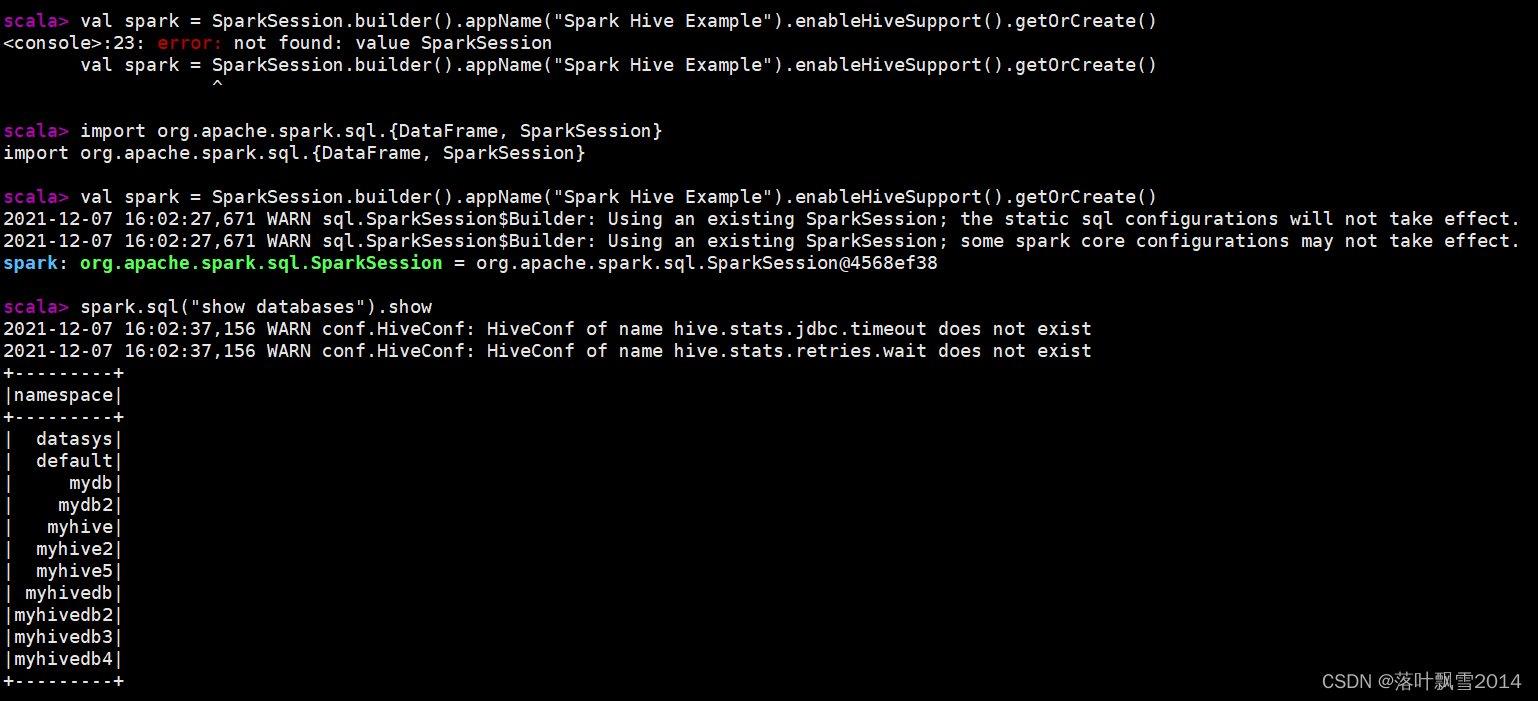
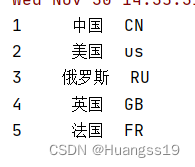
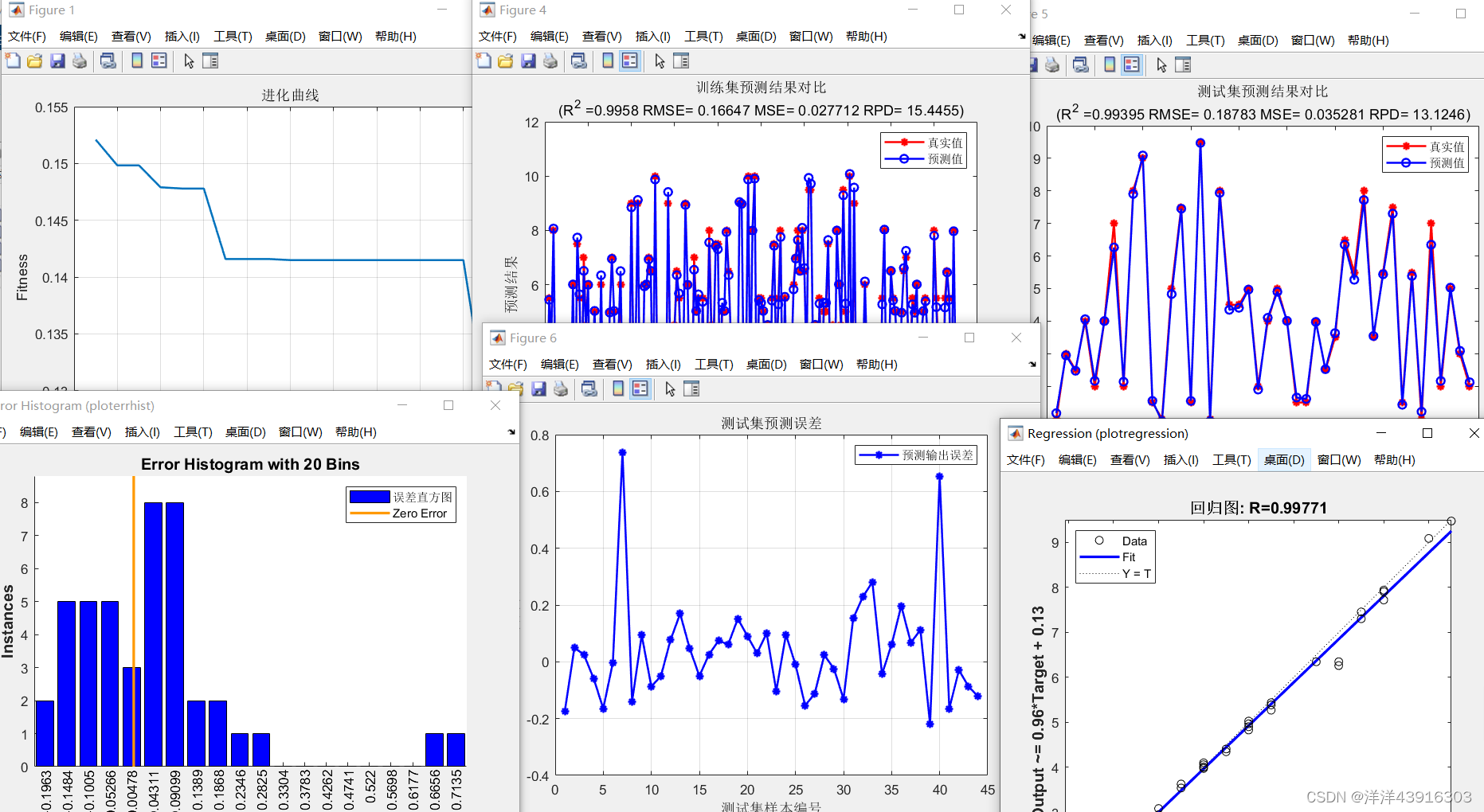







![[附源码]计算机毕业设计springboot居家养老服务系统小程序](https://img-blog.csdnimg.cn/1ce7757e53a74ef9b340ba60d161f87b.png)
![[附源码]计算机毕业设计JAVA闲置物品交易管理系统](https://img-blog.csdnimg.cn/f62305b75e074038876a03d28f81e82f.png)




